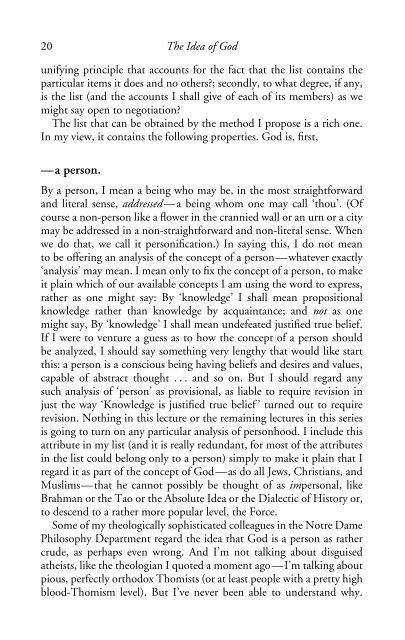The Problem of Evil - Common Sense Atheism
The Problem of Evil - Common Sense Atheism
The Problem of Evil - Common Sense Atheism
Create successful ePaper yourself
Turn your PDF publications into a flip-book with our unique Google optimized e-Paper software.
20 <strong>The</strong> Idea <strong>of</strong> God<br />
unifying principle that accounts for the fact that the list contains the<br />
particular items it does and no others?; secondly, to what degree, if any,<br />
is the list (and the accounts I shall give <strong>of</strong> each <strong>of</strong> its members) as we<br />
might say open to negotiation?<br />
<strong>The</strong> list that can be obtained by the method I propose is a rich one.<br />
In my view, it contains the following properties. God is, first,<br />
—a person.<br />
By a person, I mean a being who may be, in the most straightforward<br />
and literal sense, addressed—a being whom one may call ‘thou’. (Of<br />
course a non-person like a flower in the crannied wall or an urn or a city<br />
may be addressed in a non-straightforward and non-literal sense. When<br />
we do that, we call it personification.) In saying this, I do not mean<br />
to be <strong>of</strong>fering an analysis <strong>of</strong> the concept <strong>of</strong> a person—whatever exactly<br />
‘analysis’ may mean. I mean only to fix the concept <strong>of</strong> a person, to make<br />
it plain which <strong>of</strong> our available concepts I am using the word to express,<br />
rather as one might say: By ‘knowledge’ I shall mean propositional<br />
knowledge rather than knowledge by acquaintance; and not as one<br />
might say, By ‘knowledge’ I shall mean undefeated justified true belief.<br />
If I were to venture a guess as to how the concept <strong>of</strong> a person should<br />
be analyzed, I should say something very lengthy that would like start<br />
this: a person is a conscious being having beliefs and desires and values,<br />
capable <strong>of</strong> abstract thought ... and so on. But I should regard any<br />
such analysis <strong>of</strong> ‘person’ as provisional, as liable to require revision in<br />
just the way ‘Knowledge is justified true belief ’ turned out to require<br />
revision. Nothing in this lecture or the remaining lectures in this series<br />
is going to turn on any particular analysis <strong>of</strong> personhood. I include this<br />
attribute in my list (and it is really redundant, for most <strong>of</strong> the attributes<br />
in the list could belong only to a person) simply to make it plain that I<br />
regard it as part <strong>of</strong> the concept <strong>of</strong> God—as do all Jews, Christians, and<br />
Muslims—that he cannot possibly be thought <strong>of</strong> as impersonal, like<br />
Brahman or the Tao or the Absolute Idea or the Dialectic <strong>of</strong> History or,<br />
to descend to a rather more popular level, the Force.<br />
Some <strong>of</strong> my theologically sophisticated colleagues in the Notre Dame<br />
Philosophy Department regard the idea that God is a person as rather<br />
crude, as perhaps even wrong. And I’m not talking about disguised<br />
atheists, like the theologian I quoted a moment ago—I’m talking about<br />
pious, perfectly orthodox Thomists (or at least people with a pretty high<br />
blood-Thomism level). But I’ve never been able to understand why.
















